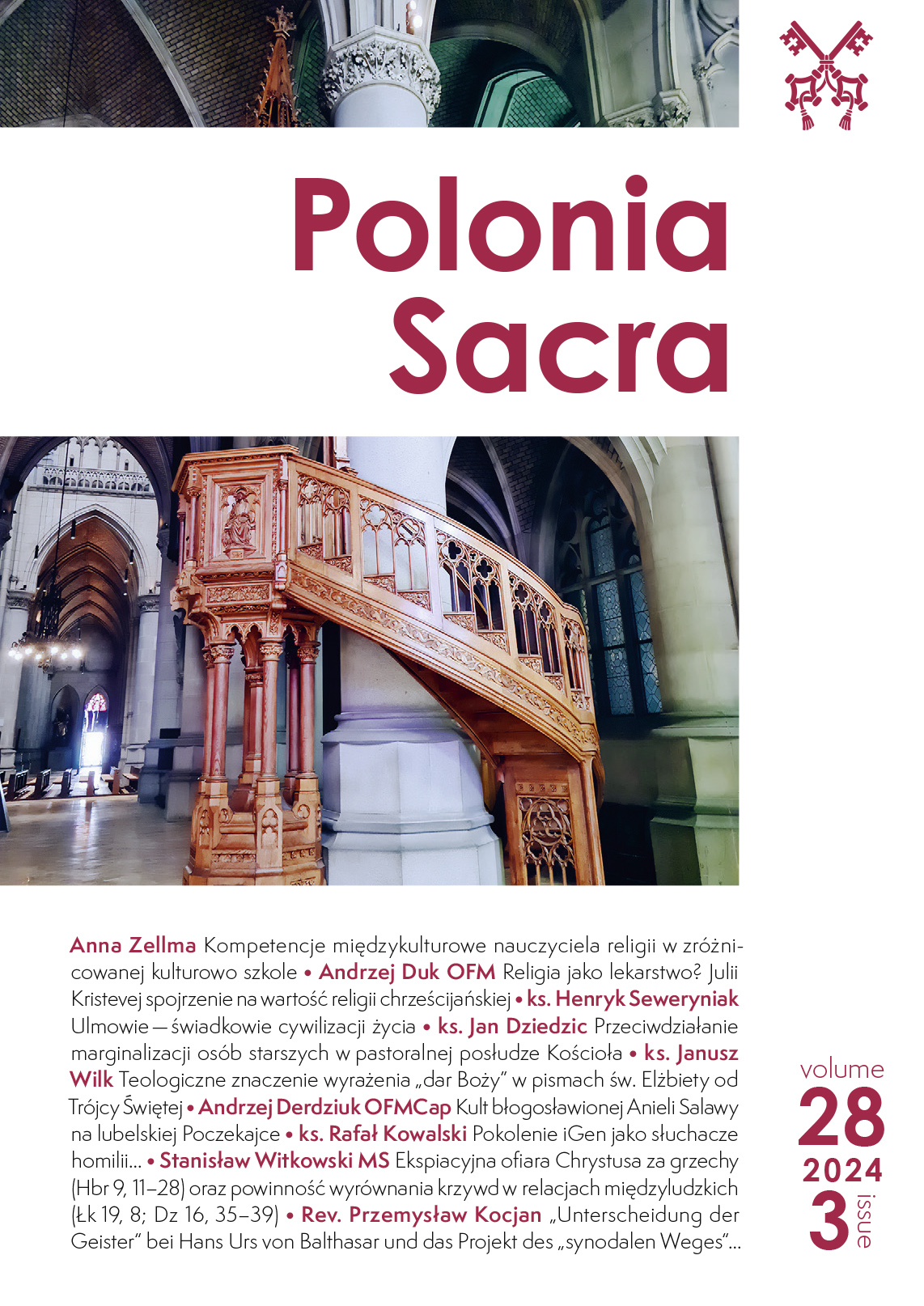“Discernment of spirits” in the theology of Hans Urs von Balthasar and the “Synodal way” project in Germany
DOI:
https://doi.org/10.15633/ps.28309Keywords:
Hans Urs von Balthasar, Ignatius of Loyola, discernment of spirits, Synodal pathAbstract
“Discernment of spirits” sounds anachronistic to modern world and is associated with exorcism, occultism, or other obscure practices. It rarely brings the memory of the community of Qumran, St. Paul, Origen or the Desert Fathers, although detailed information on this subject can be found there. Some people think about advanced philosophy or psychology, even though, among other things, attention should be paid to the development of signaled controls. The titular discernment of spirits has its source in fascinating story and coincides with the history of the human spirit. Moreover, the “ghost walk” — whether we like it or not — continues, and its field becomes another existence. The last word on this matter has not been said yet. Therefore, it is interesting to return to the theology of “discernment of spirits” by Hans Urs Balthasar, which is based on the spiritual exercises of St. Ignatius of Loyola, whose opinion is new in the article. The role of this article is significant in a way that emphasis is on practicality and the use of revealing reality, rather than systematicity and discipline of the lecture, and in fact in “discernment of spirits” on the Synodal path in Germany.
References
Athanasiou S., Im Zentrum steht der Logos, „Die Tagespost“ 29.09.2022, S. 34.
Balthasar H. U. von, Du hast Worte ewigen Lebens. Schriftbetrachtungen, Einsiedeln 1989.
Balthasar H. U. von, In der Fülle des Glaubens, Krakau 1991.
Balthasar H. U. von, Klarstellungen. Zur Prüfung der Geister, Freiburg–Basel–Wien 1972.
Balthasar H. U. von, Theologik. Der Geist der Wahrheit, Einsiedeln 2015.
Bibel, Die Einheitsübersetzung, Stuttgart 2016.
Bues E. H., Gott fragt uns: „Lieber Mensch wo bist Du ohne mich gelandet?“, „Die Tagespost“ 10.11.2022, S. 14.
Franziskus, Ansprache an die Gläubigen der Diözese Rom, 18.09.2021, www.vatican.va/content/francesco/de/speeches/2021/september/documents/20210918-fedeli- diocesiroma.html (13.12.2023).
Franziskus, Das Apostolische Schreiben „Evangelii gaudium“ über die Verkündigung des Evangeliums in der Welt von heute, Freiburg–Basel–Wien 2013.
Ignatius von Loyola, Sämtliche Werke, Bd. 2, Krakau 1968.
Koch K., In der treue zu Christus bleiben, „Die Tagespost“ 29.09.2022, S. 33.
Konda J., Das Verhältnis von Theologie und Heiligkeit im Werk von Hans Urs von Balthasar, Bonn 1989.
Kongregation für die Bischöfe, Brief an den Kardinal Reinhard Marx, 04.09.2019, www.synodalerweg.de/fileadmin/redaktion/diverse_downloads/dossiers_2019/2019-09- 04-Schreiben-Rom-mit-Anlage-dt-Uebersetzung.pdf (13.12.2023).
Marx R., Sternberg Th., Brief an die Gläubigen in Deutschland, 27.11.2019, www.synodalerweg.de/fileadmin/redaktion/diverse_downloads/dossiers_2019/2019-12- 01_Brief-Kard.-Marx-und-Prof.-Dr.-Sternberg.pdf (13.12.2023).
Müller G., Was ist katholisch?, Freiburg–Basel–Wien 2021.
Papst Franziskus, Deutsche, sucht eure Quelle!, www.vaticannews.va/de/papst/news/2022-11/papst-franziskus-bahrain-fliegende-pk-deutschland-fazit-kirche.html (13.12.2023).
Schlosser M., Die Gabe der Unterscheidung. Texte aus zwei Jahrtausenden, Sankt Ottilien 2015.
Synodalisierung. Eine Zerreißprobe für die katholische Weltkirche? Expertinnen und Experten aus aller Welt beziehen Stellung, hrsg. von P. M. Zulehner, P. Neuner, A. Hennersperger, Ostfildern 2022.
Unterscheidung der Geister — ein Exkurs durch die Geschichte, http://sankt-marien-zittau.de/wp-content/uploads/2020/02/Unterscheidung-der-Geister.pdf (13.12.2023).
Zollner H., Trost — Zunahme an Hoffnung, Glaube und Liebe. Zum theologischen Ferment der ignatianischen „Unterscheidung der Geister“, Innsbruck 2004.
Zweites Vatikanisches Konzil, Dogmatische Konstitution „Lumen gentium“ über die Kirche, www.vatican.va/archive/hist_councils/ii_vatican_council/documents/vat-ii_const_19641121_lumen-gentium_ge.html (12.12.2023).
Downloads
Published
Issue
Section
License
Copyright (c) 2024 Przemyslaw Kocjan

This work is licensed under a Creative Commons Attribution 4.0 International License.
Authors who publish with this journal agree to the following terms:
- Authors retain the copyright and full publishing rights without restrictions, and grant the journal right of first publication with the work simultaneously licensed under a Creative Commons Attribution 4.0 International License that allows others to share the work with an acknowledgement of the work's authorship and initial publication in this journal.
- Authors are able to enter into separate, additional contractual arrangements for the non-exclusive distribution of the journal's published version of the work (e.g., post it to an institutional repository or publish it in a book), with an acknowledgement of its initial publication in this journal.
- Authors are permitted and encouraged to post their work online (e.g., in institutional repositories or on their website) prior to and during the submission process, as it can lead to productive exchanges, as well as earlier and greater citation of published work (See The Effect of Open Access).

